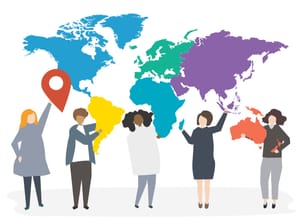Despite the lack of facilities and awareness in many parts of society for people with special needs, Dr. Mahita Jarjapu, who was diagnosed with profound hearing loss, is the first member of her family to obtain a PhD degree. Her academic journey – filled with disadvantages, challenges, determination, and support – is truly inspirational for early career researchers.
I had the pleasure of having a conversation with Dr. Mahita Jarjapu to promote awareness, help to destigmatize disability, advocate for accessibility, and build a barrier-free environment for people with disabilities in academia. As a hearing-challenged researcher, Dr. Jarjapu is in a unique position in academic research and is actively involved in bringing awareness and improving accessibility to support people with disabilities in STEM.
Madhumala Sadanandappa (MS): Tell us about your professional journey in STEM
Mahita Jarjapu (MJ): I have recently joined as a postdoctoral researcher in Prof. Bjoern Peters’ group at the Center for Infectious Disease and Vaccine Research at the La Jolla Institute for Immunology. Before this, I was a research associate with Prof. Chris Bailey-Kellogg at Dartmouth College, an Ivy League institute in the United States. After completing my Masters in Chemistry from the Indian Institute of Technology Madras, India, I did my PhD with Prof. R. Sowdhamini at the National Centre for Biological Sciences (NCBS), Bengaluru, India. My primary research interests lie at the intersection of bioinformatics, immunology, computational chemistry, and protein design.
MS: Given your functional needs, how did you get into mainstream education?
MJ: At the age of two, I was diagnosed with profound hearing loss. Aware that hearing is crucial for speech and language development, my parents immediately admitted me to a special school for deaf children, Balavidyayala, in Chennai, India. The school specialized in early intervention and trained my parents and me on how to use hearing aids for making the best use of my residual hearing to develop speech, language, and communication skills. To facilitate my higher education and integration into society, my parents chose my training in English, as it is difficult for deaf people to learn a second language. Five years of intensive training at Balavidyalaya helped me gradually overcome the barrier imposed by my hearing loss, enabled me to speak, and prepared me to participate in mainstream education. Soon after, I successfully started my regular elementary schooling. I am grateful to all of my teachers at Balavidyalaya and especially to my parents, whose determination enabled me to communicate orally, without signing, and to be independent.
MS: What led you to choose a research career?
MJ: Throughout my schooling, I was fortunate to have good friends, supportive teachers, and an inclusive educational environment. Eventually, I became interested in biology and chemistry and wanted to pursue medicine for higher education. However, given the work culture of the medical field and lack of accessible facilities, a deaf person practicing medicine was challenging. So I enrolled in a Bachelors in Biological Sciences, which was a turning point in my life.
Except for a few understanding peers and teachers, the attitude of the majority of people towards me – judgmental, underestimation, disregard, and lack of patience to communicate with me - was unbearable. While on the personal end, the unsolicited expression of sympathy and being persuaded to accept a marriage alliance made me uncomfortable. The feeling of dissatisfaction and isolation started growing in me; I was frustrated from being underestimated and undermined. That’s when I decided to demonstrate my capabilities and change people’s perspective towards me.
I channeled my frustrations into a burning passion and aimed for a Masters in Chemistry admission in IIT-Madras, India’s premier education and research institution, a feat which my acquaintances deemed highly impossible to achieve. I devoted extra hours in the library and received help from my friends for notes, as I was missing a lot of information during classroom lectures. Two years of hard work and perseverance finally paid off and I was able to begin my research journey at IIT-Madras.
MS: How were your PhD days? How did your lab colleagues and PhD mentor support your needs, as well as your research?
MJ: I was very fortunate to join Prof. Sowdhamini’s research group at NCBS, Bengaluru, for my PhD. She was incredibly supportive, patient, accommodative, and thoughtful; she also strengthened my self-confidence. She created a barrier-free environment in the lab and was always open to improving accessibility in the lab/institution. For instance, to minimize the information that I missed during lab meetings, my advisor initiated meeting minutes. After group discussions and seminars, she would follow up with me through one-on-one meetings and emails. For the effective delivery of my talks, she offered several useful tips to improve my presentation slides. During my thesis defense, my advisor patiently repeated every question (more than 30) that my external examiner was asking over the Skype meeting.
Most importantly, my advisor instilled a team spirit and a sense of inclusivity in the lab. We worked in collaboration, and I never felt excluded either in the lab or during our informal interactions outside the lab. In my presence, instead of their mother tongue, my colleagues would speak in English, the only language in which I can communicate with others. Being included and the feeling of being equal – my achievements were neither overrated nor marked as extraordinary – was crucial for the successful completion of my PhD.
MS: Tell us about your experiences at international conferences.
MJ: During the Keystone symposium (2017) held in Banff, Canada, the organizers offered special assistance to me in the form of live captioning the seminars. This practical approach helped me to make the most of the conference and expanded my professional network. I hope that conference organizers will take the necessary measures to accommodate participating researchers with disabilities and improve accessibility by offering a barrier-free environment in future conferences and symposiums.
MS: What are the challenges for students with disabilities in research?
MJ: I can primarily speak for non-signing deaf students educated by the oral-aural method. To follow conversations, we directly look at the individual’s face as we rely heavily on lip-reading. Farther distance from the speaker and low-light settings, commonly practiced in academic seminars and conferences, make it difficult for us to follow the talks, especially without an accompanying PowerPoint presentation. Unlike classroom teaching, referring to textbooks or published papers is not an alternative option if the speaker presents unpublished work. To quote someone on group discussions and Q&A sessions – “it is like watching a ping pong match with multiple balls between multiple players at the same time”, which limits our participation.
MS: In your experience, how can accessibility for people with deafness in academia be improved?
MJ: A real game-changer would be incorporating real-time closed captioning in classroom discussions, seminars, and conferences. During a nine-day biomedical entrepreneurship workshop that I attended, the organizers offered real-time captioning throughout the course, including the group discussions. To my surprise, I did not have to rely on other participants' notes, and the knowledge that I gained in this course made me realize the amount of information that I normally miss in classes without real-time captioning.
Automated captioning software such as Microsoft Teams, Google Slides, and mobile apps like Live Transcribe is an alternative in situations where real-time captioning is not possible. However, the accuracy of these automated captioning software depends on the speaker’s accent; therefore, they may not be 100 percent accurate.
In general, awareness about people with disabilities, improving accessibility, and creating an inclusive environment empowers early career researchers with disabilities to thrive in academia.
MS: Are there any pandemic-associated challenges?
MJ: Several! In particular, mask-wearing (safety is a priority, though!) either during in-person or virtual meetings limits my ability to communicate. Due to network issues and poor video quality, it is hard to follow speakers in virtual seminars. I wish for a captioning option in Zoom meetings. In the virtual world, I listen to the speaker by using a mobile app that transcribes the speaker’s words to text. A positive aspect is that due to chat options it is relatively easy to follow the Q&A sessions, and I am missing less information!
MS: What is your message to early career researchers with disabilities?
MJ: Remember, disability does not mean inability! How you perceive yourself and what you think of yourself is more important. Be mindful of your challenges and work your way through triumphing many of them, living with a few of them, and ignoring the rest. Voice your struggles to sensitize people around you and improve their awareness of the difficulties we go through. It is our responsibility.
For further reading:
- Dr. Mahita Jarjapu
- Celebrating scientists with disabilities by the Royal Society
- DisabledInSTEM
- Disabled Academic Collective
- Guidelines for writing and referring to people with disabilities
- Disability language guide
- Alexander Graham Bell Association for the Deaf and Hard of Hearing
"Having known Mahita from the beginning of her research days at NCBS, I have seen her evolve both as a person and as a scientist. Her indomitable mindset, eagerness to learn new things, grit, perseverance, patience, and dedication has brought her a long way in her scientific journey. In the process, Mahita has managed to touch the lives of many, who will continue to support her and also admire her accomplishments. I am sure she will be an inspiration for generations of aspiring bright minds with special abilities."
- Dr. Pritha Ghosh, Ph.D., Research Scientist, nference, Bengaluru, India
About the author: Madhumala K. Sadanandappa is a Research Associate at the Department of Molecular and Systems Biology, Geisel School of Medicine at Dartmouth, Hanover, NH. Connect with her on Twitter or by email: madhumalaks@gmail.com
We welcome comments, questions and feedback. Please contact us at ecrlife [dot] editors [at] gmail [dot] com.
Would you like to share your own story, insight or opinion? Pitch us here.
Follow us on Twitter to stay up to speed with our latest blog post releases.







